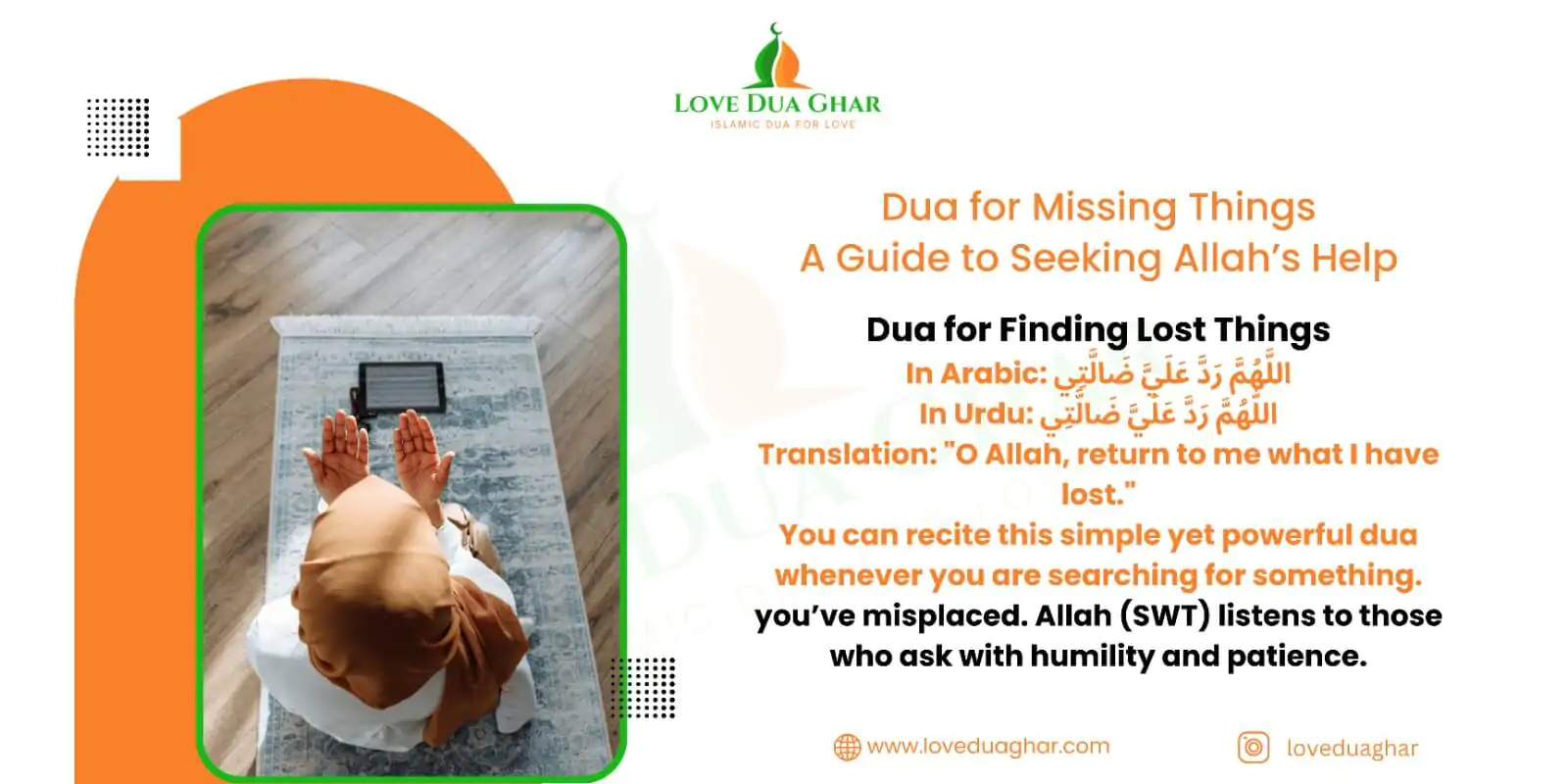A warm welcome to all our valued readers. Losing something valuable causes distress. But as Muslims, We turn to Allah (SWT) for guidance. Reciting the dua for missing things helps you seek His assistance. Whether it’s a cherished item or something sentimental, trusting Allah and reciting the right duas can ease your heart. Maulana Rizwan Khan, our great scholar, has helped many people who are facing difficulties in their lives. They live happy and peaceful lives with his guidance and Allah’s blessings. If you have any questions or problems, contact Loveduaghar for help from our scholar Rizwan Khan.
In this article, we will explore some prayers and tips to seek Allah’s assistance. With patience and faith, these powerful Duas can help you find what you’ve lost or bring peace to your heart if it’s not found.
Importance of Dua for Missing Things
The importance of this dua holds great significance in Islam, as it demonstrates the strong bond between a believer and Allah (SWT). When something is lost, believers often experience frustration and anxiety. However, turning to Allah through dua helps ease those feelings and reminds us of our dependence on Him. This act of dua is not solely focused on finding material things but also serves as a spiritual exercise that strengthens faith and patience. By reciting the dua for missing, we actively strengthen our faith in Allah’s ultimate power and wisdom, acknowledging that He controls everything, both large and small, including the things we lose in life.
What Is Dua for Missing Things?
When something is lost, Muslims are encouraged to seek Allah’s guidance through specific Duas (prayers). Reciting a dua for missing things is a spiritual practice that reflects our belief in Allah’s ability to help us in all matters, big or small. Below is a step-by-step guide on how to approach this dua with sincerity and focus:
- Acknowledge Allah as the Ultimate Helper: Before you begin your dua, remind yourself that Allah (SWT) is the One who knows everything, including the whereabouts of your lost item. Believe that only He can truly guide you to it.
- Make a Sincere Intention (Niyyah): Intention is key when making a dua. Ensure your heart is clear and your mind is focused. Your intention should be to ask Allah for help in finding what you’ve lost. Be genuine in your request, knowing that Allah listens to those who sincerely ask for His assistance.
- Recite the Dua with Full Conviction: When reciting the dua for missing thing, it’s important to have complete faith in Allah’s power. Don’t doubt His ability to help you, whether it’s something small or large. The act of dua itself is a reminder of our reliance on Him.
- Ask for Assistance with Humility: Approach Allah with humility, acknowledging that you need His guidance and help in recovering your lost item. Whether it’s something valuable or personal, seek His assistance with a humble heart.
Importance of Dua for Missing Things
This dua holds significant importance in Islam, as it reflects the deep connection between a believer and Allah (SWT). When something is lost, it can lead to frustration and anxiety, but turning to Allah through dua serves as a reminder of our reliance on Him. Dua is not just about finding material possessions; it’s a spiritual act that strengthens faith and patience. By reciting the dua, we are reminded of Allah’s power and knowledge, and we acknowledge that He is in control of all matters, including the small and large things we lose in life.
Dua for Finding Lost Things
In Arabic: اللَّهُمَّ رَدَّ عَلَيَّ ضَالَّتِي
In Urdu: اللّٰهُمَّ رَدَّ عَلَيَّ ضَالَّتِي
Translation: “O Allah, return to me what I have lost.”
You can recite this simple yet powerful dua whenever you are searching for something. you’ve misplaced. Allah (SWT) listens to those who ask with humility and patience.
What to Do Alongside Reciting the Dua?
In addition to reciting the dua, here are some practical tips to help you in your search:
- Make a thorough search: Look in places where you last saw the item.
- Stay calm: Panicking won’t help. Stay composed and recite the dua calmly.
- Seek help from others: Ask your family or friends if they have seen the missing item.
- Give charity (Sadaqah): Giving charity with the intention that Allah will help you find what is lost can bring blessings.
Conclusion
Reciting the dua for missing things reminds us that our ultimate reliance should be on Allah. While we must take practical steps to find our lost items, we should never underestimate the power of sincere prayer. Whether you find what you’re looking for or not, know that Allah has a plan for everything, and His timing is perfect.
If you’ve lost something important, try reciting this dua with faith and trust in Allah’s wisdom. Whether your item is returned or not, you’ll find peace in knowing you sought help from the One who controls all things.
Frequently Asked Questions (FAQs)
Q1. Can I recite the Dua for missing things multiple times?
A1. Yes, you can recite this Dua as many times as you wish. Repetition with sincerity and trust in Allah (SWT) strengthens your connection with Him. It is important to approach the Dua with full conviction, knowing that Allah listens to those who ask with patience and humility. Reciting the Dua repeatedly can bring peace to your heart, whether or not the lost item is found.
Q2. Is there anything else I should do besides reciting the Dua for missing things?
A2. While reciting the Dua is important, you should also take practical steps to search for the lost item. Stay calm, look thoroughly in places where you last saw the item, and ask for help from family or friends. Additionally, giving charity (Sadaqah) with the intention of seeking Allah’s help in finding your lost item can bring blessings. Remember that Allah’s guidance may come in unexpected ways, and maintaining patience is key.



